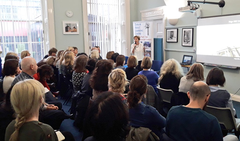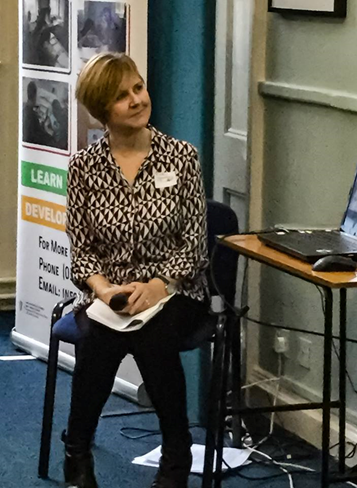The Dublin Adult Learning Centre (DALC) located in the heart of the North East Inner City of Dublin, is celebrating 20 years in existence. DALC has been providing basic education services to residents both new and old, following in the tradition of the Dublin Literacy Scheme, which has operated out of 3, Mountjoy Square since 1974.
DALC is a community of learners; this sense of community and respect for the adult learner provides a special and inclusive learning experience for students. We are guided by a strongly held belief in the transformative nature of education. It was, therefore, a great pleasure for us in celebrating our twenty years to welcome Professor Vicky Duckworth of Edge Hill University, Manchester, as the keynote speaker for our Transforming Lives Conference. Professor Duckworth’s area of research focuses on Adult Literacy and Further Education as a tool to empower and give a voice to marginalised and silenced communities.
Dr Duckworth’s presentation challenged us to think about the ideologies that drive education and literacy. She posed questions regarding the purpose of learning, who benefits by it, whether it is a route for empowerment and liberation, or if it can also be a means of control. We were asked to consider very fundamental questions as to what counts as literacy and who constructs curricula. Discourse on perceptions of literacy in the UK over the past decade has identified two ways of considering literacy. The dominant model is the valuing of cognitive literacy narrowly measured with standardised performance indicators over social literacy, where literacy is seen as “an element of social practice reflecting the social and historical locatedness of the learner and the content to be learnt”.
Dr Duckworth argues that this model of literacy in the school system fails many people and has labelled them because of their failure to acquire it. This is where Adult Education has traditionally stepped in to redress the balance.
The practice within the sector views education through a different lens. Adult Education and Community Development is based on the principles of equality and social justice, of meeting the learner where they are at, as opposed to adhering to a one-size-fits all curriculum.
Dr Duckworth’s Transforming Lives research aims to understand and provide evidence of how the Further Education sector in the U.K. is vital in transforming lives and consequently communities. The research involved providing students, teachers, parents and employers with an opportunity to tell their stories via video, uninterrupted. The stories are available on the Transforming Lives Website, where their voices can be heard. The interviews are informal and reciprocal, reinforcing the positive learning identities that the participants talk about having achieved though returning to Further Education.
The students’ stories give the viewer context and allow the interviewee to tell their own story in their own voice of how going back to education affected them and their family and wider community. It showed that education, when contextualised and equal, can be the driver of transformation and social justice and a force that can challenge inequality.

Participants at the conference then split into focus groups to consider the research and in particular consider the challenge of staying learner centred in the face of a neo-liberal agenda that seeks to impose a model, that has already failed students, on the Adult Education sector through the insistence on accreditation as the only measure of progress.
The theoretical frameworks as described by Dr Duckworth have provided participants with a guide against which to judge the direction of Adult Education policy in Ireland.
There were also a number of informative, practical workshops in the afternoon, focusing on best practice and how to adhere to the values of the Adult Education and Community Sector in the face of pressure to do otherwise.
It was a terrific day and participants left with a renewed sense of the possible when communities work together and listen to each other.
